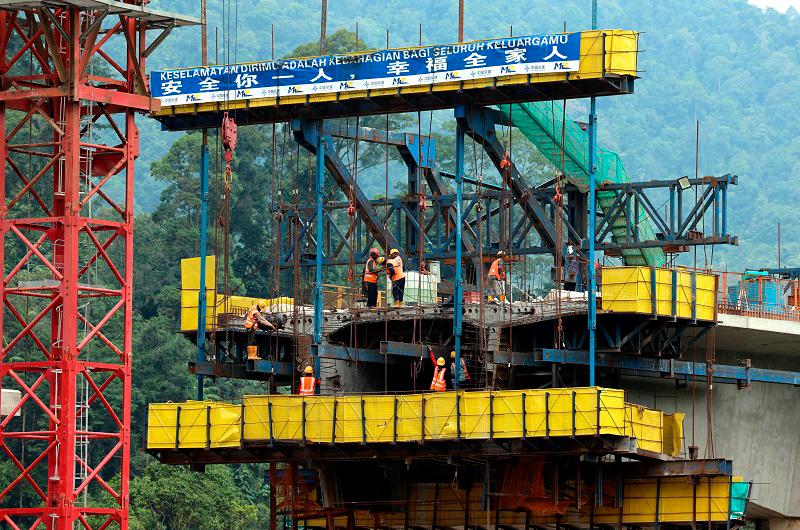KUALA LUMPUR: The government remains committed to providing adequate expenditure resources, particularly essential services and programmes, to support economic growth, enhance public welfare and foster a more resilient and prosperous society.
According to the Fiscal Outlook and Federal Government Revenue Estimate report, RM421 billion, or 20.2% of GDP, has been allocated in the Budget 2025, signalling a 3.3% increase from the 2024 revised budget.
Of this, RM335 billion, or 79.6% of total expenditure, is channelled to operating expenditure (OE), while the remaining RM86 billion is allocated for development expenditure (DE).
RM54.7 billion is allocated for debt service charges (DSC), representing 16.3% of OE. Of this, 98.5%, or RM53.9 billion, is for domestic loans, while the balance is for offshore loans.
In terms of sectoral allocation, the social sector is allocated RM163 billion, or 38.7% of total expenditure, followed by the economy (RM62.2 billion; 14.8%), security (RM42.6 billion; 10.1%), and general administration (RM23.1 billion; 5.5%) sectors.
The remaining balance of RM130.1 billion is budgeted for charged expenditures and transfer payments.
For 2025, OE is budgeted at RM335 billion, or 16.1% of GDP, reflecting a 4.2% increase compared to the revised 2024 budget. This increase is driven by higher allocations for emoluments, retirement charges, and DSC.
The report further said the allocation for supplies and services is expected to increase to meet the growing demand for effective public service delivery.
Emoluments remain the largest component of OE, accounting for 31.6% and projected to grow by 6.2% to RM105.9 billion.
This increase is attributed to the gradual implementation of the Public Service Remuneration System (SSPA), which raises the basic salary from 7% to 15%.
Retirement charges, which account for 12.1% of OE, are expected to grow by 17.7% to RM40.6 billion.
Of this, RM30.3 billion or 74.6%, is earmarked for pension payments, while the remaining is allocated for gratuity payments and cash awards in place of accumulated leave.
The report also noted that pensions will be adjusted accordingly when the SSPA is implemented in December 2024.
Subsidies and social assistance, which constitute 15.7% of OE, are projected to decrease by 14.4% to RM52.6 billion in 2025.
This decline is due to the implementation of the electricity subsidy rationalisation and targeted fuel subsidy programmes.
Of the total, 45.5% is allocated for various social assistance and incentives aimed at supporting vulnerable groups.
Supplies and services, comprising 12.1% of OE, are anticipated to increase by 3.7% to RM40.7 billion.
A significant 86.6% of this allocation is for material supplies, cleaning and security services, repairs and maintenance, telecommunication and utilities, as well as other services.
The report further said the DE will remain at RM86 billion in 2025, with the largest share allocated to the economic sector (46.5%), followed by social (34.8%), security (14.3%), and general administration (4.4%).
Approximately 2,000 new projects and programs, totalling RM58.6 billion, have been approved under the Fifth Rolling Plan.
The Government will ensure sufficient resources for ongoing programs while introducing high-impact initiatives to sustain growth and improve citizens’ quality of life.
The trade and industry subsector will receive RM3.1 billion, including RM200 million for the National Industrial Policy 2030 (NIMP 2030) and RM306 million for the National Energy Transition Roadmap (NETR).
Funding will also help attract investments by supporting the Johor-Singapore Special Economic Zone (JS-SEZ) Infrastructure Facilitation Fund and Silver Valley Technology Park 1 in Kinta, Perak.
RM40 billion is allocated to enhance national competitiveness through essential infrastructure and investment support.
The transportation subsector will receive RM17.6 billion (43.9% of the total), focusing on improving connectivity in rural areas and reducing urban congestion.
Key projects include a new bridge and road in Sarawak, an additional lane on the North-South Expressway (PLUS) in Johor, and ongoing projects like the Pan Borneo Highway in Sabah.
The government has set aside RM7.1 billion for financial commitments, mainly for public transportation and real estate development, supporting critical infrastructure for economic resilience.
The social sector will receive RM29.9 billion, marking a 6% increase from the RM28.2 billion allocated in 2024.









